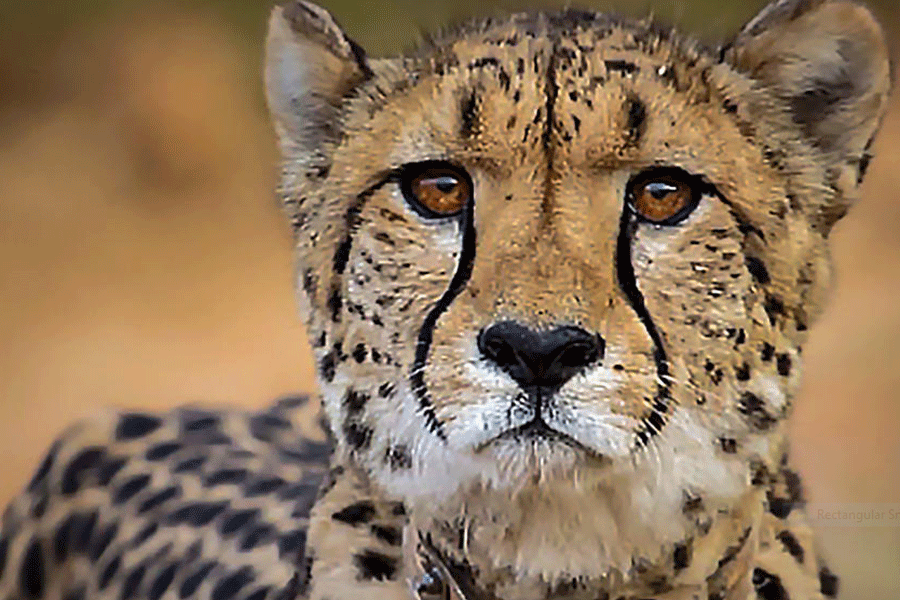Amid concerns about the wellbeing of the cheetahs translocated from Africa, the Centre has approved a proposal for the filming of a four-part web series on Project Cheetah to "showcase the efforts of the country to the world", official records show.
It is learned that the filming is likely to start in September, around the second anniversary of Project Cheetah on September 17.
In a letter to the chief wildlife warden of Madhya Pradesh on July 21, Vaibhav Chandra Mathur, Deputy Inspector General of the National Tiger Conservation Authority (NTCA), wrote that the eighth technical committee of the authority accorded approval to the proposal for a web series on the world's first intercontinental translocation of a large carnivore -- Project Cheetah.
"In this regard, it is requested to kindly facilitate M/s Shen Films and Planting Productions to undertake and complete filming at the Kuno National Park and the Gandhi Sagar Wildlife Sanctuary as per standard terms and conditions, so that efforts of the country can be showcased to the world," the letter read.
The state's chief wildlife warden recommended the proposal on August 6.
"It is requested to grant permission to M/s Shen Films and Planting Productions for filming as per the terms and conditions and also ensure necessary support to the crew members during the documentation of Project Cheetah," Subharanjan Sen, the then CWLW of the state, said in a letter to the additional principal chief conservator of forests, Shivpuri, and the divisional forest officer, Mandsaur.
"Please also ensure that during the filming of cheetahs, the minimum number of crew members carry out their work under the supervision of officials/veterinarians in the bomas," it added.
According to the proposal, seen by PTI, the web series will be aired on Discovery Network in 170 countries in different languages.
The film aims to highlight the conceptualisation of the project, the struggles faced in bringing the animal back to India, the status of the cheetahs and the expectations for the future.
The goal is to make people "understand the nuances of this mammoth project", the proposal said.
The creators, who have previously collaborated with the NTCA and the Wildlife Institute of India, have also approached 'Madhya Pradesh Tourism' and the MP Tiger Foundation for securing financial assistance of Rs 50 lakh for the project's execution.
"Although financial assistance isn't possible, we will give full support for the filming of the web series as directed," an official said, requesting anonymity.
Bhopal-based wildlife activist Ajay Dubey questioned the rush to film the "documentary", saying that the project faces "several challenges that should be addressed first".
He also questioned the process for granting permission to film the web series, noting that records indicate the Cheetah Project Steering Committee -- formed in May last year to monitor and review the progress of the project and advise the MP forest department and the NTCA on its execution -- "never discussed the issue".
Twenty cheetahs have been brought to India from Africa so far -- eight from Namibia in September 2022 and 12 from South Africa in February 2023.
Some of the cheetahs were initially released into the wild but were returned to enclosures by August 13 last year after three cheetahs died of septicemia.
The only free-ranging cheetah, Pawan, was found dead on Tuesday, with officials suggesting drowning as the primary cause of death.
In a meeting last week, the steering committee decided to release the cheetahs and their cubs into the wild in a phased manner after the monsoon withdraws from the central parts of the country, which typically happens by the first week of October.
The project initially drew criticism due to the animals' deaths. However, with the birth of 12 cubs this year, officials say the project is on the right track.
Since they arrived in India, eight adult cheetahs -- three females and five males -- have died. Seventeen cubs have been born in India, with 12 surviving.
According to the officials, India has also expedited efforts to bring a new batch of cheetahs by the end of the year, with a delegation set to visit South Africa soon for ground-to-ground negotiations.
PTI has learned that negotiations are also ongoing with Kenya, and an MoU is being finalised.
The 'Action Plan for Reintroduction of Cheetah in India' talks about bringing around 12-14 cheetahs each year from South Africa, Namibia and other African countries for five years to establish a founder stock.
The next batch of cheetahs will be brought to Gandhi Sagar, selected as the second site for introduction, as Kuno has already exceeded its cheetah carrying capacity of 20.
PTI has also learned that Kuno, the first home to translocated cheetahs in India, continues to struggle with a high leopard population and a low prey base, which has delayed preparations at Gandhi Sagar.
Summary records of steering committee meetings also reveal that prey augmentation and leopard management are among the major challenges facing the initiative.
As an interim solution, authorities have been introducing prey into both Kuno and Gandhi Sagar. The high leopard population in both areas also prompted the initiation of a leopard translocation drive.
Cheetahs have coexisted with leopards and lions in Africa, but some officials in India consider the high leopard population in Kuno and Gandhi Sagar problematic as it would "reduce the prey biomass for cheetahs". PTI GVS IJT
Except for the headline, this story has not been edited by The Telegraph Online staff and has been published from a syndicated feed.










